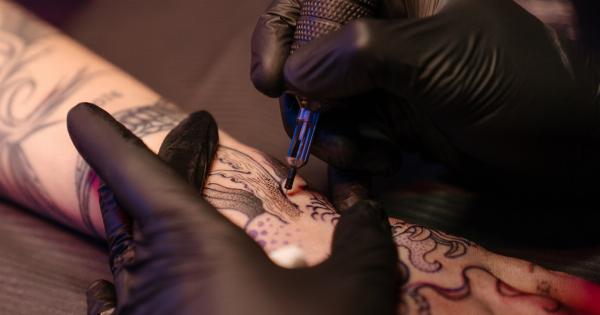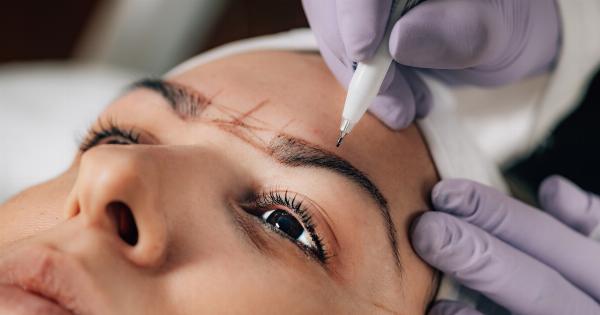A tattoo is a form of body modification where a design is made by inserting ink, dyes, and pigments into the dermis layer of the skin. This process punctures the skin with a needle and injects colored ink, leaving a permanent mark on the body.
Tattoos have been a part of human culture for thousands of years, with evidence of their existence dating back to ancient civilizations.
How Tattoos Work
When a tattoo is created, the needle punctures the skin and injects ink into the dermis, which is the second layer of the skin. The immune system recognizes the ink particles as foreign substances and attempts to remove them.
White blood cells called macrophages are sent to engulf and digest the ink particles. However, the ink particles are too large for the macrophages to remove completely, resulting in the ink becoming trapped within the skin.
The Composition of Tattoo Ink
Tattoo ink consists of various compounds that give it color and help it to stay in the skin. Different pigments are used to create different colors, and these pigments can be made from minerals, metals, or organic compounds.
Some common tattoo ink pigments include iron oxide (black), titanium dioxide (white), and cadmium (red, yellow, and orange).
The Relationship Between Tattoos and Blood
Despite the belief held by some individuals, having a tattoo does not alter the composition of a person’s blood. The ink used in tattoos is not directly injected into the bloodstream, but rather into the dermis layer of the skin.
Therefore, any ink particles that may enter the bloodstream are present in such minimal quantities that they do not have a significant impact on blood composition or function.
Tattoos and Blood Donation
In many countries, individuals with tattoos are eligible to donate blood as long as certain criteria are met.
These criteria typically involve waiting for a specified period of time after receiving a tattoo to ensure that there is no risk of bloodborne infections. This waiting period is necessary because the process of getting a tattoo involves puncturing the skin, which can potentially introduce pathogens into the bloodstream.
Healing Process and Tattoo Ink Migration
During the healing process after getting a tattoo, a small percentage of ink may migrate from the dermis into the surrounding skin layers. This migration can cause the tattoo to appear slightly blurred or faded over time.
However, this migration does not affect blood composition or cause the ink to travel throughout the body.
Tattoo Removal and Blood Composition
When a person chooses to remove a tattoo through methods like laser tattoo removal or tattoo cover-up, the ink is broken down into smaller particles by the laser or covered with new pigments.
These smaller particles may then be cleared from the body through the lymphatic system or expelled through natural body processes. However, this process does not have an impact on blood composition.
Allergies and Tattoo Pigments
While tattoos themselves do not alter blood composition, it is possible for individuals to have an allergic reaction to certain tattoo pigments.
These reactions can range from mild to severe and may include symptoms such as itching, redness, swelling, or rash. In rare cases, severe allergic reactions can occur, leading to systemic symptoms. If an allergic reaction to tattoo ink is suspected, it is important to seek medical attention.
Tattoos and Medical Conditions
Some medical conditions, such as hemophilia or certain blood disorders, may affect a person’s ability to get a tattoo or increase the risks associated with getting one.
It is important for individuals with pre-existing medical conditions to consult with healthcare professionals before getting a tattoo to assess any potential risks or complications.
The Psychological Aspect of Tattoos
Tattoos are not just physical markings; they often have deep personal meanings for individuals. They can serve as a form of self-expression, a display of identity or beliefs, or a way to commemorate significant life events.
The decision to get a tattoo is a personal one, and individuals should consider their motivations and the potential long-term implications before proceeding.
Tattooing as Cultural Significance
Tattooing has played a significant role in many cultures throughout history. Various communities have used tattoos as a form of cultural expression, identification, or rites of passage.
In some societies, specific tattoo designs may indicate a person’s social status, occupation, or affiliation with a particular group. Understanding the cultural significance of tattoos can help foster respect and appreciation for this art form.
Tattoo aftercare
Proper tattoo aftercare is essential for maintaining the appearance and longevity of a tattoo. After getting a tattoo, it is important to follow the aftercare instructions provided by the tattoo artist.
These instructions typically include keeping the tattoo clean and moisturized, avoiding direct sunlight, and refraining from picking or scratching the tattooed area. With proper care, tattoos can heal well and retain their vibrant colors.
Conclusion
Tattoos are permanent forms of body art that have been practiced for centuries.
While tattoos do not alter blood composition, it is important to consider various factors such as allergies, medical conditions, and cultural significance when deciding to get a tattoo. Understanding the process of tattooing, the composition of tattoo ink, and proper aftercare can help individuals make informed decisions and enjoy their tattoos for years to come.


























